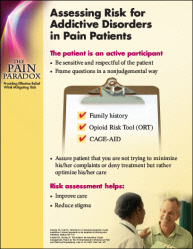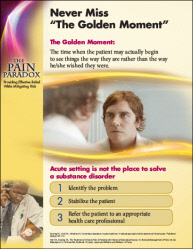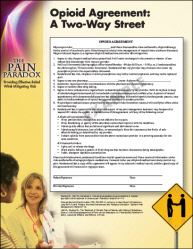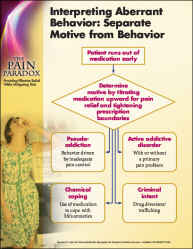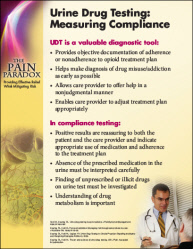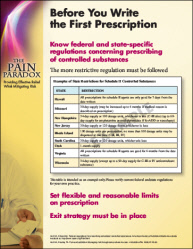
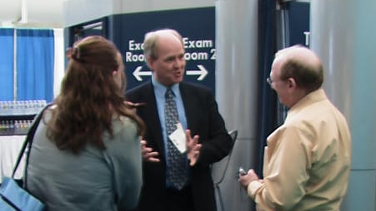
IDEAL MAILING LIST
Sign up for information on the next Ideal Experience click here
Sign up for information on the next Ideal Experience click here
VIRTUAL LEARNING CENTER
Click here to visit the IDEALCME Virtual Learning Center and Earn Free CME/CE credit
Course Materials (Online Syllabus)
Below you will find the educational information presented during the IDEAL CME/CE activity May 7-8, 2009 at the American Pain Society Annual Meeting. This material is provided for your information only. CME/CE credit was offered for participating during the live event only.
To download a PDF copy of the panels and transcripts, click here
Panel 1: Understanding Physical Dependence vs Addiction
 Do most patients on long-term opioids develop some degree of physical dependence but rarely develop addictive disorders?
Do most patients on long-term opioids develop some degree of physical dependence but rarely develop addictive disorders?
By Dr. Douglas Gourlay
Listen to commentary
Listen to answer
Listen to clinical pearl
 Do most patients on long-term opioids develop some degree of physical dependence but rarely develop addictive disorders?
Do most patients on long-term opioids develop some degree of physical dependence but rarely develop addictive disorders?
By Dr. Douglas Gourlay
Listen to commentary
Listen to answer
Listen to clinical pearl
---
Panel 2: Universal Precautions in Pain Medicine
 Is it easy to determine who will become a problematic user of opioids?
Is it easy to determine who will become a problematic user of opioids?
By Dr. Howard Heit
Listen to commentary
Listen to answer
Listen to clinical pearl
 Is it easy to determine who will become a problematic user of opioids?
Is it easy to determine who will become a problematic user of opioids?
By Dr. Howard Heit
Listen to commentary
Listen to answer
Listen to clinical pearl
---
Panel 3: Assessing Risk for Addictive Disorders in Pain Patients
 Should patients with past drug abuse problems receive opioids?
Should patients with past drug abuse problems receive opioids?
By Dr. Paul Arnstein
Listen to commentary
Listen to answer
Listen to clinical pearl
 Should patients with past drug abuse problems receive opioids?
Should patients with past drug abuse problems receive opioids?
By Dr. Paul Arnstein
Listen to commentary
Listen to answer
Listen to clinical pearl
---
Panel 4: Never Miss “The Golden Moment”
 Is the best course of action when a substance use disorder is identified in the acute setting to deny care and inform law enforcement authorities?
Is the best course of action when a substance use disorder is identified in the acute setting to deny care and inform law enforcement authorities?
By Dr. Douglas Gourlay
Listen to commentary
Listen to answer
Listen to clinical pearl
 Is the best course of action when a substance use disorder is identified in the acute setting to deny care and inform law enforcement authorities?
Is the best course of action when a substance use disorder is identified in the acute setting to deny care and inform law enforcement authorities?
By Dr. Douglas Gourlay
Listen to commentary
Listen to answer
Listen to clinical pearl
---
Panel 5: Opioid Agreement: A Two-Way Street
 Should the Opioid Agreement initially set loose guidelines that can be made more stringent later in the event of aberrant behavior?
Should the Opioid Agreement initially set loose guidelines that can be made more stringent later in the event of aberrant behavior?
By Dr. Paul Arnstein
Listen to commentary
Listen to answer
Listen to clinical pearl
 Should the Opioid Agreement initially set loose guidelines that can be made more stringent later in the event of aberrant behavior?
Should the Opioid Agreement initially set loose guidelines that can be made more stringent later in the event of aberrant behavior?
By Dr. Paul Arnstein
Listen to commentary
Listen to answer
Listen to clinical pearl
---
Panel 6: Interpreting Aberrant Behavior: Separate Motive from Behavior
 Is a patient who escalates his dose and returns early for a refill probably developing an addiction?
Is a patient who escalates his dose and returns early for a refill probably developing an addiction?
By Dr. Douglas Gourlay
Listen to commentary
Listen to answer
Listen to clinical pearl
 Is a patient who escalates his dose and returns early for a refill probably developing an addiction?
Is a patient who escalates his dose and returns early for a refill probably developing an addiction?
By Dr. Douglas Gourlay
Listen to commentary
Listen to answer
Listen to clinical pearl
---
Panel 7: Urine Drug Testing: Measuring Compliance
 If a urine test shows the absence of the prescribed drug, is the drug probably being diverted?
If a urine test shows the absence of the prescribed drug, is the drug probably being diverted?
By Dr. Douglas Gourlay
Listen to commentary
Listen to answer
Listen to clinical pearl
 If a urine test shows the absence of the prescribed drug, is the drug probably being diverted?
If a urine test shows the absence of the prescribed drug, is the drug probably being diverted?
By Dr. Douglas Gourlay
Listen to commentary
Listen to answer
Listen to clinical pearl
---
Panel 8: Before You Write the First Prescription
 Do federal laws and regulations regarding the prescribing of controlled substances supersede state laws and regulations?
Do federal laws and regulations regarding the prescribing of controlled substances supersede state laws and regulations?
By Dr. Howard Heit
Listen to commentary
Listen to answer
Listen to clinical pearl
 Do federal laws and regulations regarding the prescribing of controlled substances supersede state laws and regulations?
Do federal laws and regulations regarding the prescribing of controlled substances supersede state laws and regulations?
By Dr. Howard Heit
Listen to commentary
Listen to answer
Listen to clinical pearl
---


